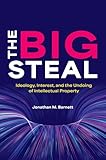The big steal : ideology, interest, and the undoing of intellectual property / Jonathan M. Barnett.
Publisher: New York, NY : Oxford University Press, [2024]Description: xiv, 401 pages : illustrations ; 24 cmContent type:- text
- 9780197629529
- 346.73048 23/eng/20241022
- KF2980 .B38 2024
| Item type | Current library | Shelving location | Call number | Materials specified | Status | Notes | Barcode | |
|---|---|---|---|---|---|---|---|---|
 BOOKs
BOOKs
|
National Law School | General Stacks | 346.73048 BAR (Browse shelf(Opens below)) | HB | Available | Recommended by Dr. Betsy Rajasingh | 40126 |
Includes bibliographical references and index.
Making and Unmaking IP Rights -- The Accidental Alliance -- The Political Economy of Copyright Law --The Rise of Unfair Use -- How Courts Rewrote the DMCA -- The Hesitant Return of Reason -- The Political Economy of Patent Law -- The Patent Litigation Explosion and Other Patent Horribles -- Patent Trolls and the Demise of the Injunction -- The Patent Holdup Conjecture -- China and the Accidental Alliance -- How Free Stuff Distorts Innovation and Competition -- How Weak IP Rights Shield Incumbents and Impede Entry -- Free Stuff Gets Dangerous -- Free Stuff and the Decline of the Free Press -- The Inevitability of Property Rights -- Reinvigorating IP Rights and the Innovation Ecosystem.
"For almost two decades, U.S. courts, legislators, and antitrust regulators have consistently taken actions to reduce the strength of intellectual property rights in technology and creative markets. This policy trajectory has reflected the influence of an "accidental alliance" of two core constituencies that have common commitments to relaxed enforcement (or, in some cases, abolition) of intellectual property rights. These constituencies include, on the one hand, thought leaders in the scholarly and advocacy communities that resist robust intellectual property rights on ideological or other intellectual grounds, and on the other hand, digital intermediaries and vertically integrated firms that have an economic interest in reducing the cost of acquiring content or technology assets. This policy consensus reflects overstated or incomplete assertions concerning the impact of robustly enforced intellectual property rights and overlooks the enabling function played by intellectual property rights in facilitating investment, innovation, and competition in technology and creative environments. In both patent and copyright law, policy groupthink has resulted in a truncated property-rights regime that threatens the long-term performance of the U.S. and global innovation ecosystem by favoring technology platforms and content aggregators over "stand-alone" innovation specialists in biopharmaceuticals, semiconductors, and other critical sectors in technology and creative markets"-- Provided by publisher.
There are no comments on this title.
